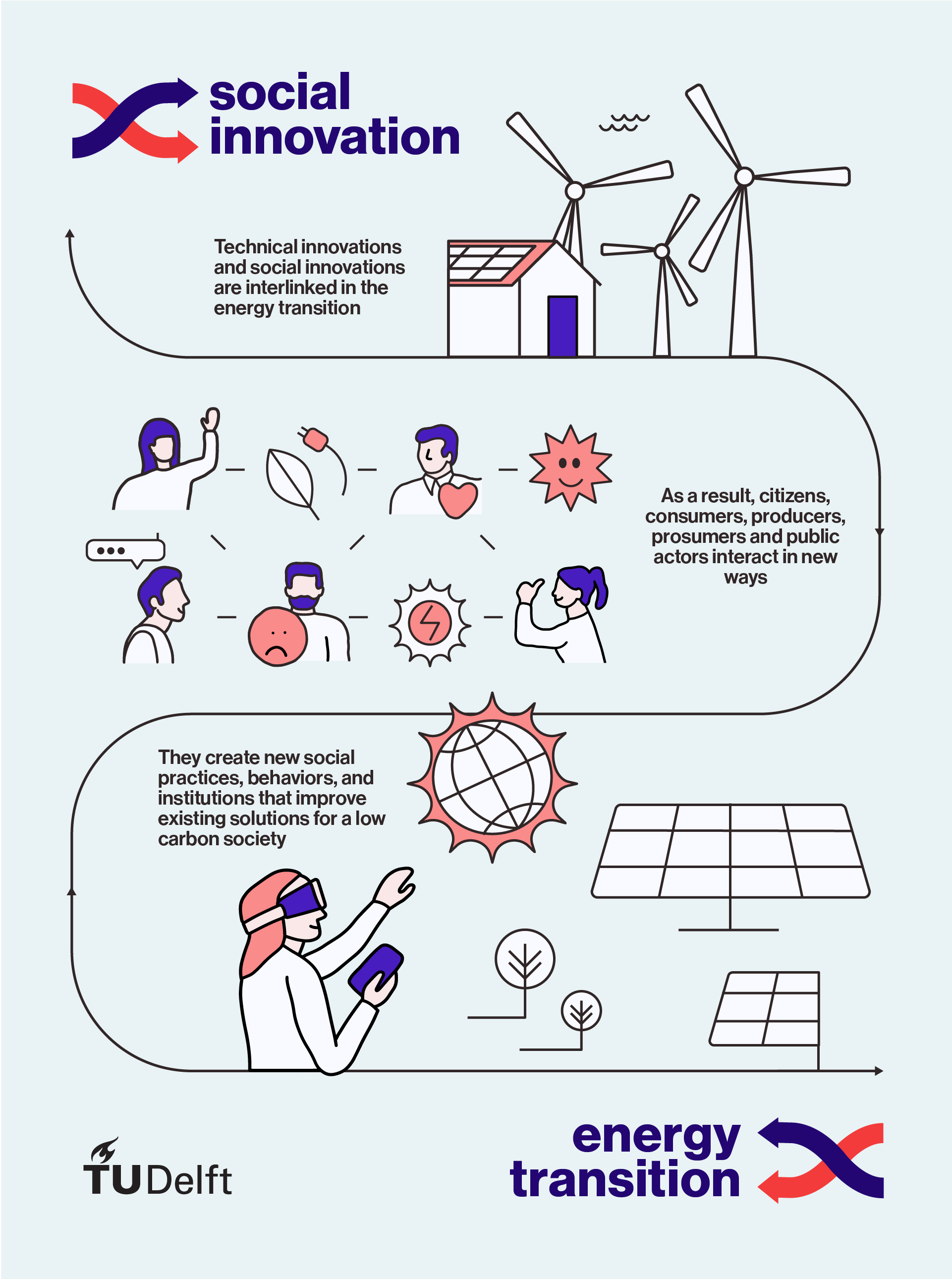What is social innovation?

Social innovation is roughly defined as,
New ideas that work in meeting social goals
(Mulgan et al., 2007)
Social innovation in the energy transition
With social innovation in the energy transition the concept of social innovation is contextualised in the domain of energy systems transitioning into more sustainable ones that also allow for more distributed generation of energy. This does not mean that the concept should be misunderstood as all social or human (i.e. “non-technical”) factors that are at play in the energy transition. In the recent past misunderstanding was very common. To cope with this misunderstanding we were convinced there was a need for a new definition. This led us to conduct a literature review that would eventually be published in a special issue that followed upon the 2017 Symposium we organized. In the guest editorial note of the special issue we defined social innovation in the energy transition as,
Innovations that are social in their means and contribute to low carbon energy transition, civic empowerment and social goals pertaining to the general wellbeing of communities.
(Hoppe & de Vries, 2019, p. 141)
This triggered an academic debate to search for a more holistic interpretation that would surpass the mere instrumentalist interpretation of the concept, that would “reduce it to a tool (merely) serving particular policy objectives.” This led to coining social innovation as an important dimension of current transformations in energy systems, and broadening its understanding, providing a broader imagination and strategizing of structural changes in energy systems. This includes 1) more attention to the normative complexity of the concept; 2) more appreciate of the multi-actor nature of social innovation; 3) understand it as an analytical entry point for socio-material intertwinement; and, 4) to understand social innovation as premised on experimentalism-based intervention logics (Wittmayer et al., 2020).
Application in the energy transition
With social innovation in the energy transition the concept of social innovation is contextualised in the domain of energy systems transitioning into more sustainable ones that also allow for more distributed generation of energy.
Key topics relevant to social innovation in the energy transition are for instance:
- Community energy initiatives (e.g., renewable energy cooperatives), its implications for society and impact;
- New governance arrangements, policies and modes for inter-actor collaboration in the energy domain, in particular supporting grassroots movements;
- New business models and institutional arrangements that support them in support of citizen-led action and projects in the energy transition;
- New participative approaches like co-creation and co-production of energy transition policy; (e.g. in (r)urban living labs);
- Social incentives to ‘nudge’ behavioral change;
- Serious energy games (like Go2Zero).
At Delft University of Technology
At Delft University of Technology researchers work on several projects that address the matter.
References
- Hoppe, T., & de Vries, G. (2019). Social Innovation and the Energy Transition. Sustainability, 11(1), 141. doi.org/10.3390/su11010141
- Mulgan, G., Tucker, S., Ali, R., & Sanders, B. (2007). social innovation: what it is, why it matters and how it can be accelerated. The Young Foundation. youngfoundation.org/wp-content/uploads/2012/10/Social-Innovation-what-it-is-why-it-matters-how-it-can-be-accelerated-March-2007.pdf
- Wittmayer, J. M., de Geus, T., Pel, B., Avelino, F., Hielscher, S., Hoppe, T., Mühlemeier, S., Stasik, A., Oxenaar, S., Rogge, K. S., Visser, V., Marín-González, E., Ooms, M., Buitelaar, S., Foulds, C., Petrick, K., Klarwein, S., Krupnik, S., de Vries, G., … Härtwig, A. (2020). Beyond instrumentalism: Broadening the understanding of social innovation in socio-technical energy systems. Energy Research & Social Science, 70, article 101689. doi.org/10.1016/j.erss.2020.101689
